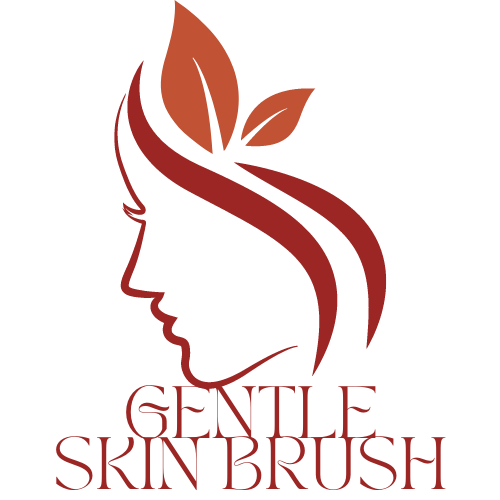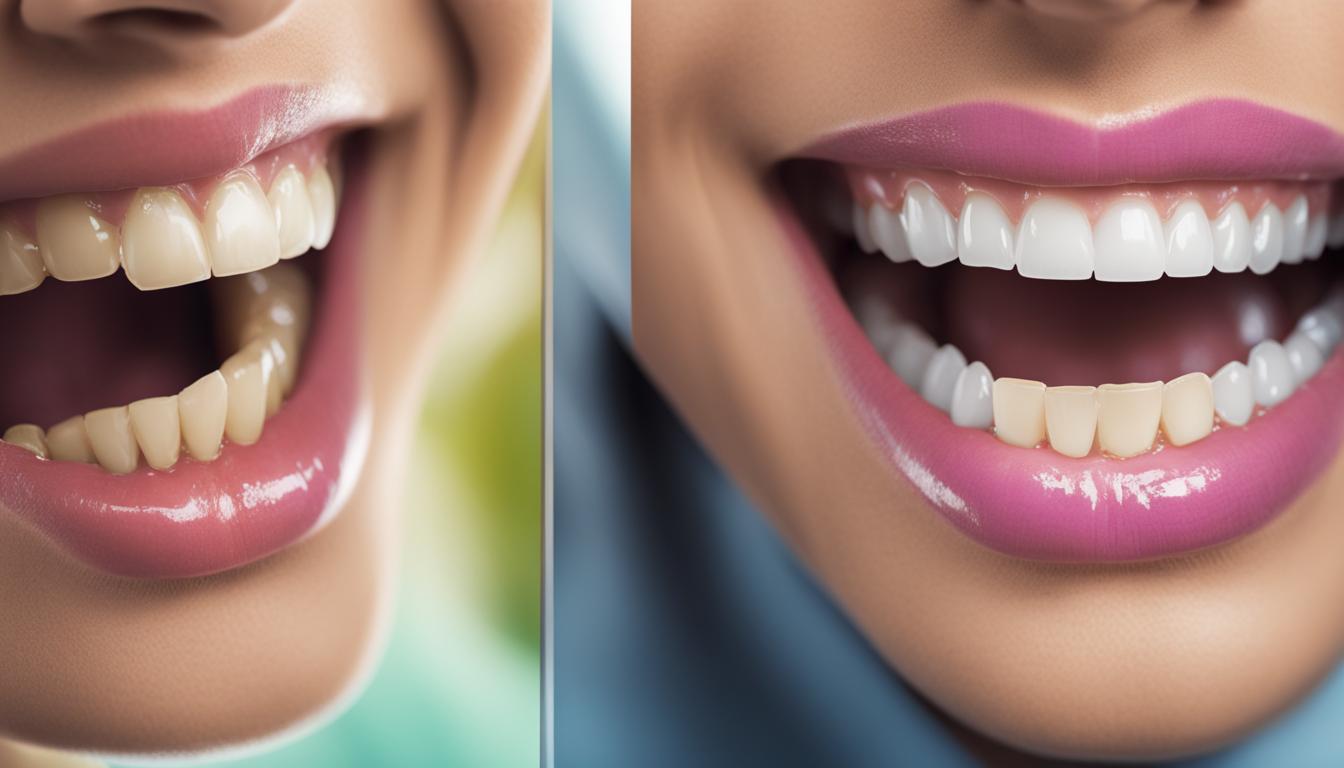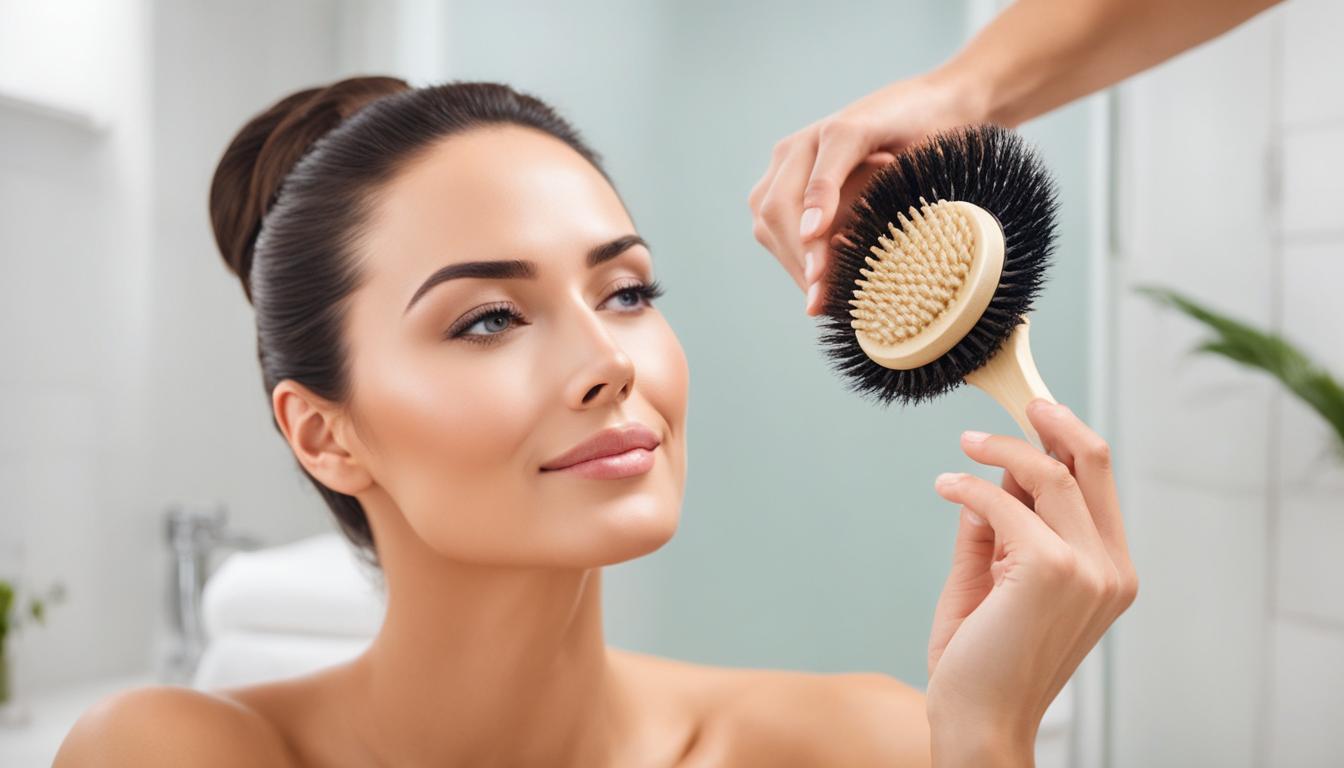Preventing cavities and maintaining good oral hygiene is essential for a healthy smile. Brushing your teeth and using mouthwash are two key components of a dental hygiene routine that can help in the fight against tooth decay. By incorporating these practices into your daily routine and following proper tooth brushing techniques, you can give your teeth the best chance at staying cavity-free.
Contents
- 1 The Benefits of Using Mouthwash for Dental Health
- 2 Understanding Different Types of Mouthwash
- 3 Side Effects of Using Mouthwash and Best Practices
- 4 Can Mouthwash Replace Brushing and Flossing?
- 5 Choosing the Right Mouthwash for Your Needs
- 6 Conclusion
- 7 FAQ
- 7.1 Can brushing and mouthwash stop tooth decay?
- 7.2 What are the benefits of using mouthwash for dental health?
- 7.3 What are the different types of mouthwash?
- 7.4 Are there any side effects of using mouthwash?
- 7.5 Can mouthwash replace brushing and flossing?
- 7.6 How do I choose the right mouthwash for my needs?
- 7.7 What is the conclusion regarding dental hygiene and mouthwash?
- 8 Source Links
Key Takeaways:
- Brushing and using mouthwash are crucial for preventing tooth decay and cavities.
- A proper dental hygiene routine should include both brushing and mouthwash.
- Brushing your teeth correctly and using mouthwash can help reduce the risk of cavities and maintain healthy teeth.
- Regular brushing, flossing, and using mouthwash are the best approach for optimal oral hygiene.
- Choose a mouthwash that suits your specific oral health needs.
The Benefits of Using Mouthwash for Dental Health
Mouthwash offers numerous benefits for maintaining healthy teeth and overall dental health. Incorporating mouthwash into your dental care routine can enhance the effectiveness of brushing and flossing, providing additional protection against tooth decay and gum disease.
One of the primary advantages of using mouthwash is its ability to combat bad breath. Mouthwash contains ingredients that help kill the bacteria responsible for unpleasant breath odors, leaving your mouth feeling fresh and clean.
In addition to fighting bad breath, mouthwash plays a crucial role in preventing tooth decay. It can help remove food particles and plaque that may be missed during brushing and flossing, reducing the risk of cavities. Mouthwash also contains antimicrobial properties that can inhibit the growth of bacteria and reduce the risk of gingivitis and gum disease.
“Using mouthwash can improve your oral hygiene routine by reducing plaque buildup, fighting bad breath, and promoting healthy gums.”
Moreover, mouthwash can provide additional benefits such as enamel strengthening, reduced tooth sensitivity, and teeth whitening. Different types of mouthwash, such as fluoride mouthwash, antiseptic mouthwash, and whitening mouthwash, offer specific benefits tailored to individual oral health needs.
The Benefits of Using Mouthwash for Dental Health
| Mouthwash Benefits |
|---|
| Fights bad breath |
| Reduces the risk of tooth decay |
| Prevents plaque buildup |
| Reduces the risk of gingivitis and gum disease |
| Removes food particles and bacteria |
| Strengthens enamel |
| Reduces tooth sensitivity |
| Whitens teeth |
Using mouthwash as part of your daily dental care routine can significantly contribute to maintaining optimal oral health. However, it is important to note that while mouthwash provides many benefits, it should not replace regular brushing and flossing. Instead, mouthwash should be used in conjunction with these essential oral hygiene practices.
By adopting a comprehensive approach to dental care that includes thorough brushing, daily flossing, and incorporating mouthwash into your routine, you can enhance your oral hygiene efforts and enjoy the benefits of a healthy smile.
Understanding Different Types of Mouthwash
When it comes to maintaining optimal oral health, using the right mouthwash can make a significant difference. There are several types of mouthwash available in the market, each targeting specific oral health concerns. Understanding the different types of mouthwash can help you choose the one that suits your needs best.
Fluoride Mouthwash
Fluoride mouthwash is a popular choice for preventing tooth decay and cavities. It contains fluoride, a mineral that helps strengthen tooth enamel and makes it more resistant to acid attacks from plaque bacteria. Regular use of fluoride mouthwash can significantly reduce the risk of tooth decay and promote overall dental health.
Antiseptic Mouthwash
Antiseptic mouthwash is designed to kill bacteria in the mouth, helping to prevent infections and bad breath. This type of mouthwash contains ingredients like alcohol or essential oils that have antimicrobial properties. Antiseptic mouthwash can be particularly beneficial for individuals with mouth infections or persistent bad breath.
Whitening Mouthwash
If you’re looking to enhance the whiteness of your teeth, whitening mouthwash can be a great option. These mouthwashes contain ingredients like hydrogen peroxide or carbamide peroxide that help remove surface stains and brighten the appearance of your teeth. Regular use of whitening mouthwash can help maintain a radiant smile.
Other types of mouthwash include cosmetic mouthwash, dry mouth mouthwash, desensitizing mouthwash, and natural mouthwash. Each of these mouthwashes offers specific benefits and caters to different oral health needs. When choosing a mouthwash, consider your dental health goals and consult with your dentist for personalized recommendations.
| Type of Mouthwash | Benefits |
|---|---|
| Fluoride Mouthwash | Prevents tooth decay and cavities by strengthening enamel. |
| Antiseptic Mouthwash | Kills bacteria, prevents infections, and freshens breath. |
| Whitening Mouthwash | Removes surface stains and enhances tooth whiteness. |
| Cosmetic Mouthwash | Provides fresh breath and a pleasant taste. |
| Dry Mouth Mouthwash | Moisturizes the mouth and reduces dryness and discomfort. |
| Desensitizing Mouthwash | Relieves tooth sensitivity and discomfort. |
| Natural Mouthwash | Contains natural ingredients and avoids chemical additives. |
Choosing the right mouthwash for your needs can contribute to a comprehensive dental care routine and help you achieve optimal oral health.
Side Effects of Using Mouthwash and Best Practices
While mouthwash is a valuable addition to your dental hygiene routine, it is essential to be aware of potential side effects. Although generally safe to use, some individuals may experience temporary mouth irritation or a burning sensation when using mouthwash. This can be more common with mouthwashes that have a high alcohol content. It’s important to note that mouthwashes containing alcohol can dissolve mucus and potentially irritate canker sores. If you have sensitive gums or mouth sores, it is recommended to choose an alcohol-free mouthwash.
When using mouthwash, it is crucial to follow the instructions provided on the package. Incorporate mouthwash into your regular oral care routine by using it after brushing and flossing at least twice a day. Ensure that you rinse your mouth thoroughly with the mouthwash, swishing it around for the recommended amount of time before spitting it out. Avoid swallowing the mouthwash, as it is not meant to be ingested. By using mouthwash in conjunction with proper brushing and flossing techniques, you can maximize its effectiveness in maintaining your oral health.
It’s important to remember that mouthwash is not a substitute for brushing and flossing. Regular brushing and flossing are crucial for removing plaque and food particles from your teeth and gums. While mouthwash can enhance your oral hygiene routine, it should be used as an additional tool to support your overall dental care efforts. By incorporating mouthwash into your daily routine and following the best practices mentioned above, you can ensure that you are maximizing the benefits of mouthwash while minimizing any potential side effects.
“Using mouthwash after brushing and flossing is a great way to complete your oral care routine. Just make sure to choose one that suits your needs and follow the recommended usage guidelines.”
Can Mouthwash Replace Brushing and Flossing?
When it comes to maintaining a healthy dental hygiene routine, the question often arises: can mouthwash replace brushing and flossing? While mouthwash offers numerous benefits for oral health, it cannot fully replace the importance of regular brushing and flossing.
Brushing your teeth twice a day with fluoride toothpaste and using dental floss daily are crucial for preventing cavities, removing plaque, and maintaining healthy gums. The mechanical action of brushing and flossing helps dislodge food particles and plaque from the teeth and gums, while mouthwash primarily acts as an additional aid in reducing bacteria and freshening breath.
Although mouthwash may provide a temporary feeling of cleanliness and fresh breath, it does not remove plaque or prevent tartar buildup. Plaque is a sticky film that forms on the teeth and contains bacteria, which can lead to tooth decay and gum disease. Regular brushing and flossing physically remove plaque, while mouthwash can only provide a temporary reduction in bacterial levels.
To ensure optimal oral hygiene, it is recommended to incorporate mouthwash into your dental care routine as a supplementary step after brushing and flossing. This way, you can maximize the benefits of each component and maintain a comprehensive approach to oral health. Remember, consistency and thoroughness in brushing and flossing, complemented by the appropriate use of mouthwash, are key to achieving and maintaining a healthy smile.
| Pros of Mouthwash | Cons of Mouthwash |
|---|---|
| – Reduces bacteria – Freshens breath – Helps prevent gum disease |
– Does not remove plaque – Does not prevent tartar buildup – Cannot replace brushing and flossing |
Choosing the Right Mouthwash for Your Needs
When it comes to selecting the best mouthwash for your oral health needs, it’s important to consider your specific requirements. With a wide variety of options available, choosing the right mouthwash can make a significant difference in maintaining optimal dental care. Here are some dental hygiene tips to help you make an informed decision:
Types of Mouthwash
Understanding the different types of mouthwash will guide you towards selecting the most suitable option. For fresh breath, mouthwashes like Thereabreathe Fresh Breathe Oral Rinse or Listerine Cool Mint are recommended. If you’re dealing with stained teeth, consider using whitening mouthwashes like Crest 3D White Brilliance Teeth Whitening. For those experiencing dry mouth, mouthwashes with xylitol can help reduce bacterial bonding. Individuals with poor gum health can opt for Listerine Gum Therapy Antiseptic. Choose a mouthwash that addresses your specific concerns.
Alcohol-Free Options
For individuals with mouth sensitivity or sores, alcohol-free mouthwashes are a better choice. Some mouthwashes with high alcohol content can dissolve mucus and irritate canker sores. By opting for alcohol-free options, you can avoid these potential side effects and still reap the benefits of mouthwash for your dental hygiene routine.
Consult Your Dentist
To ensure you choose the most effective mouthwash for your oral health, it’s always a good idea to consult your dentist. They can provide personalized recommendations based on your specific needs, dental history, and any underlying oral health conditions. Your dentist can also help you understand the potential risks and benefits associated with different mouthwash options, allowing you to make an informed decision.
| Mouthwash Type | Benefits |
|---|---|
| Fresh Breath Mouthwash | Helps combat bad breath |
| Whitening Mouthwash | Removes stains and enhances teeth whiteness |
| Dry Mouth Mouthwash | Reduces bacterial bonding and promotes saliva production |
| Gum Therapy Antiseptic Mouthwash | Helps improve gum health and prevent bacterial growth |
Remember, incorporating mouthwash into a holistic dental hygiene routine that includes regular brushing and flossing is the key to maintaining optimal oral health. By choosing the right mouthwash for your needs, you can enhance the effectiveness of your dental care regimen and achieve a healthier smile.
Conclusion
In conclusion, maintaining good dental hygiene is crucial for preventing tooth decay and maintaining optimal oral health. By incorporating both brushing and using mouthwash into your daily routine, you can effectively reduce the risk of cavities and promote healthier teeth.
Mouthwash offers additional benefits, such as fresher breath and reduced plaque and gingivitis. However, it should be noted that mouthwash is not a substitute for regular brushing and flossing. These foundational oral care practices are essential for removing food particles, bacteria, and plaque that can lead to tooth decay and gum disease.
Remember to select the right mouthwash for your specific needs. Whether you’re looking to combat bad breath, whiten your teeth, or improve gum health, there are various options available in the market. Incorporating mouthwash into your dental hygiene routine, alongside regular brushing and flossing, will help you maintain a healthy smile.
By following a consistent dental hygiene routine, including brushing, flossing, and using mouthwash, you can prevent tooth decay, promote oral health, and enjoy a confident smile for years to come.
FAQ
Can brushing and mouthwash stop tooth decay?
Brushing and using mouthwash together are effective in preventing tooth decay and cavities.
What are the benefits of using mouthwash for dental health?
Mouthwash offers benefits such as fresher breath, reduced plaque and gingivitis, and enhanced enamel strength.
What are the different types of mouthwash?
Different types of mouthwash include fluoride mouthwash, antiseptic mouthwash, whitening mouthwash, and more.
Are there any side effects of using mouthwash?
Mouthwash may cause temporary mouth irritation or a burning sensation. High alcohol content mouthwashes can also dissolve mucus and irritate canker sores.
Can mouthwash replace brushing and flossing?
While mouthwash is beneficial, it should not replace regular brushing and flossing. Both are essential for maintaining oral health.
How do I choose the right mouthwash for my needs?
Choose a mouthwash based on your specific oral health needs, such as bad breath, stained teeth, dry mouth, or gum health.
What is the conclusion regarding dental hygiene and mouthwash?
Maintaining a consistent dental hygiene routine that includes brushing, flossing, and using mouthwash is the best way to prevent tooth decay and maintain optimal oral health.





Leave a Reply